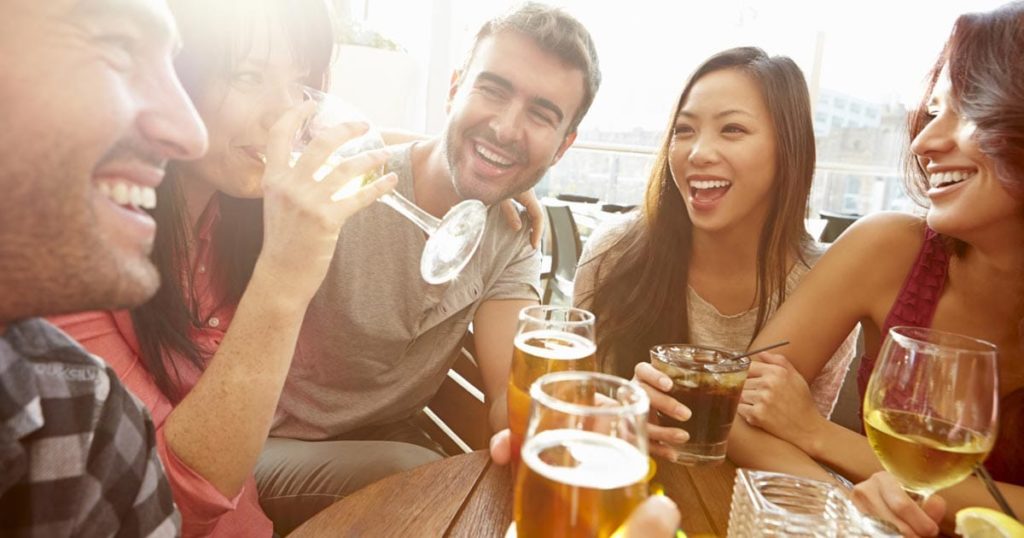If you have friends who abuse drugs or alcohol, you could be in danger of falling victim to the same self-destructive pattern of behavior. You may feel this is not the case, or that the risk is exaggerated. As a believer in self-control and personal responsibility, you may be convinced you have the willpower and awareness to prevent this from happening. Peer pressure is an adolescent phenomenon, you assert, not a problem for older, more mature men and women who know what they want and aren’t about to let drugs or alcohol interfere with their hopes and dreams. All of this may be true, and in fact you may not be much at risk even if you’ve been spending a lot of time with people who are abusing drugs and alcohol. If you simply refuse to join in, 100% of the time, you won’t develop a substance use problem regardless of what you friends or companions are doing. However, if you are drinking or using drugs with them, even if only occasionally, you may be on a slippery slope plunging toward disaster. In fact you may already be living a lie, too lost in denial and rationalization to realize or admit the significant role drugs and alcohol are now playing in your life.
The Bad Companionship of Drugs and Alcohol
Regardless of our life histories, we all must take responsibility for our poor choices. No one can force us to drink alcohol or use drugs in excess, nor can they force us to see the truth and seek help when a substance use problem finally develops. But that doesn’t alter the fact that drug and alcohol abuse occur within a social and cultural context. No man or woman is an island, and all of us are shaped by the people we encounter and the events we experience over the course of a lifetime. Before you dismiss the idea that your substance-abusing companions might be leading you down the road to ruin, here are a few facts to consider:
- No one who starts drinking alcohol or using drugs intends to become an addict: Substance use disorders are unplanned and unpredictable. Everyone thinks they have it under control, right up to the point where it becomes obvious they don’t. When you dabble with drugs and alcohol you’re playing with fire, and when others are with you encouraging that behavior, the danger is always greater.
- Drug and alcohol abuse are societal problems, and you are a member of society: The people you spend time with will influence your attitudes, outlooks and responses. Social relationships help shape your perspective and determine the life choices you make — whether you recognize it or not.
- Peer pressure (or peer influence) is a universal phenomenon: Regardless of their age or background, people do care what others think, and that leaves us all vulnerable to peer influence. Often the effects are subtle, and we may not realize how much the attitudes and actions of our companions are motivating our behavior. But that lack of awareness only makes us more vulnerable to peer pressure, since we have few defenses against it.
- People frequently learn to use alcohol and drugs to enhance pleasurable activities: You might believe your drug and alcohol consumption is well within the safe range. But if you’ve fallen in with a crowd that thinks you can’t have fun doing anything unless you’re intoxicated, your drug and alcohol consumption can quickly snowball.
- Negative, cynical and pessimistic world views are contagious: Many people turn to drugs and alcohol as a form of self-medication, as a way to escape from circumstances or emotions that leave them feeling helpless, miserable and depressed. If you spend time with people who combine drinking or drugging with pessimistic attitudes or cynical outlooks, their negativity may rub off on you and leave you more vulnerable to chemical dependency.
Want to Avoid Addiction? Be a Leader, Not a Follower
The best way to avoid problems with drugs or alcohol is to take command of your circumstances, without compromise or apology. Recognize that your decision-making processes do not occur in a vacuum and that the actions and attitudes of your companions will inevitably affect you. To think differently is naïve and possibly hazardous to your health. In life it is better to be a leader than a follower, and not just some of the time but all of the time when your drinking and drug habits are the subject of analysis. If you spend inordinate amounts of time with people who are careless about their drug and alcohol use and reckless about the way they live their lives in general, in the long run nothing good will come of it. If this is what you’ve been doing it’s better to get out now, before it’s too late.

